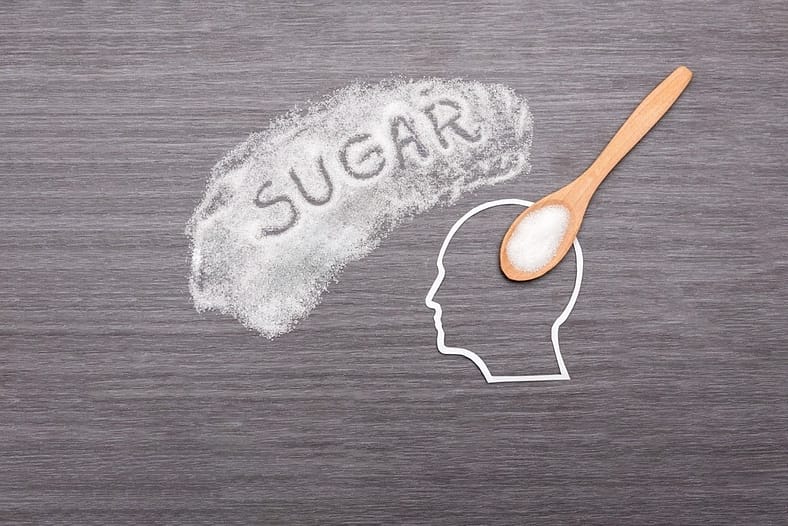

Recent studies conclude that high glucose levels from sugar impacts your memory and impair cognition. In fact, individuals with diabetes, a condition that causes elevated high blood-sugar levels, are known to increase stress and have a higher risk of developing Alzheimer’s disease, a form of dementia. It seems that the brain in type II diabetes, just like the body, has difficulty utilizing sugar for energy and this can lead to slower processing when it comes to memory retrieval. High blood sugar also contributes to damage in the brain through hardening of the arteries, thereby leading to decreased blood flow to key areas of the brain. So, is sugar all bad? Of course not, but glucose levels must remain in a tightly regulated window to prevent damage.
What is Glucose?
Glucose is the primary metabolic fuel in the body. It is formed when carbohydrates are broken down in the body. Insulin (created by your pancreas) helps move the glucose from your blood into the cells where it is metabolized to create energy. An imbalance of blood sugar and insulin can cause hypoglycemia, blood sugar that is too low; hyperglycemia, blood sugar that is too high; or diabetes.
Too much blood sugar
Hyperglycemia occurs when the body loses the ability to regulate blood sugar and the glucose concentration in the bloodstream rises too high. If the blood-glucose level remains high for an extended period of time, then that person can develop diabetes. There are two ways to measure glucose in the blood, one way is after fasting for a period of eight hours or more and the other way is measuring the blood sugar after eating, referred to as postprandial blood sugar. More often than not your doctor will measure your fasting blood-sugar levels.
Not enough blood sugar
Hypoglycemia refers to the condition when there is not enough sugar in the blood to maintain normal cellular function. The good news is that the body has several mechanisms in place to keep blood glucose within normal range so we can continue to function normally during times of high stress. There are times, however, when these mechanisms are not enough or become compromised. This can occur during a prolonged period of fasting, while taking certain medications such as insulin, or secondary to an illness. Symptoms of hypoglycemia include confusion, foggy thinking, angry outbursts, profuse sweating, feelings of anxiety, shaky arms and legs and fatigue. In extreme cases individuals can lose consciousness because the brain is being deprived of its primary fuel source.
Healthy ways to include sugar in your diet
The following are healthy ways to ensure that your body has enough glucose to keep it functioning at peak efficiency:
- Fruit offer natural forms of sugar while also providing nutrients such as vitamin C, fiber, and rich antioxidant content. Fruits like blueberries, blackberries, and purple grapes have been shown to protect the brain from the damage caused by aging.
- If you need a touch of sweet, avoid refined sugars, which fail to provide any nutrients, and opt instead for unfiltered honey or a touch of agave syrup. These still contain higher amounts of sugar—fructose, which your body metabolizes like alcohol—so moderation is the key. An idea for dessert: Combine lemon zest, a little agave syrup, water, and a touch of vanilla in a saucepan and warm until smooth. Pure over your favorite berries. Want it a little creamier? Add some Greek yogurt.
- Remember: The body’s glucose requirements can be obtained from complex carbohydrates and whole-grain products. These high-fiber foods release glucose into the bloodstream slowly so the body can use it at its own pace, thus avoiding blood-sugar swings. Whole-grain pasta, quinoa, beans, and whole-grain toast fall into this category. Other foods to consider include sweet potatoes and butternut squash. Try this simple recipe: Microwave a small-to-medium sized sweet potato until soft, cut open, mash the contents, pour in a little honey, sprinkle a little cinnamon, top with a little Greek yogurt, and enjoy.
- Avoid all products that contain high-fructose corn syrup. This concentrated form of sugar has been linked to fatty-liver disease, obesity, and acceleration of memory impairment. If possible, avoid artificial sweeteners because they have been linked to increased risk of obesity.
Insulin is important in the body for controlling blood sugar, but it may play a different role in the brain, where insulin appears to disturb memory and learning. A recent study shows that a high-fructose diet harms the brain as well as the body.


